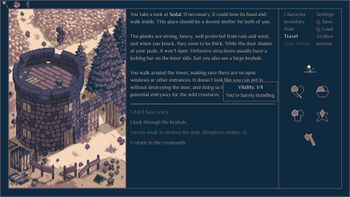Interactive fiction

Interactive fiction, often abbreviated IF, is a genre of video games that are either text-only or majority text-based.
Traditionally interactive fiction is "parser based" with the player interacting with the game by typing commands (for example "go north" or "take key"). Games like this were often called "Text adventures" and are one of the oldest types of computer games.
Modern interactive fiction also includes "choice based" games where players read a story and make choices as to how the protagonist acts. These games can be very similar to visual novels, though there are differences in presentation and audience expectation.
Differences between visual novels and choice-based interactive fiction
In essence, visual novels can be considered a form of choice-based interactive fiction. The two game genres are similar in many ways, and many interactive fiction games are developed in visual novel engines such as Ren'Py. There are even some games that appear both on VNDB and IFDB, such as Hate Plus [VNDB]. Romance games are also very popular, with many IF games featuring a cast of love interests (often called Romance Options or ROs).
While the two can be almost identical, in practice there are often stylistic and presentation differences between the two. The most obvious difference is that visual novels tend to be more image-heavy, with IF being more text-heavy and usually featuring longer paragraphs of text, akin to NVL style visual novels. While visual novels are most commonly written in first person, IF is usually written in second person.
Most (if not all) differences between choice-based IFs and VNs are not rules or set in stone: instead it is mostly about presentation and genre conventions. While you can tell the exact same story in either format, players will expect different things depending on how you label the game.
Common elements of choice-based IF and differences from VNs
- Usually written in second person
- Less image-heavy. If there are images, backgrounds are often prioritized over character art (especially in IF that are not romance focused)
- Longer paragraphs of text with more description
- Highly customizable player characters: self insert MCs are the norm, and as well as name and pronouns players often expect to be able to customize the MCs hair/skin/eye colors, hair length and texture, height and more -- while MC sprites are extremely uncommon, these attributes are instead expected to be referenced in the story text
- Often the ability to shape not only the MCs appearance and choices but also their personality (expanded below)
- Often a larger number of choices than most visual novels
- Romanceable characters are referred to as Romance Options (ROs) instead of Love Interests (LIs)
- Strong RPG influence, often with stat-based gameplay and/or dice-roll influenced outcomes (expanded below)
While VNs traditionally have had a strong influence from anime and japanese media, IF has traditionally been influenced by RPGs and classic "choose your own adventure" books. Because of this IF often features stat-based and even luck-based gameplay, often taking inspiration from pen-and-paper TTRPGs like Dungeons & Dragons. In these games when you make choices your character has a certain chance of succeeding or failing at the chosen action dependent either on their stats, a dice roll, or a combination of the two. Making certain choices can also raise or lower certain stats, not dissimilar to a traditional Dating Sim. Other RPG-like elements such as inventory systems and character traits that affect the game (such as class or race in a fantasy game) are also very common.
While VN choices are often solely about choosing the MCs actions, in IF it is common for your choices to affect the MCs personality, often represented through personality trait stats; either as independent stats or opposing pairs (such as reckless vs cautious or assertive vs reserved). These personality traits can affect the narrative, for example by locking the player out of certain choices (like a reserved player not having the choice to call somebody out in public) or changing the MCs justifications for their actions or how other characters react to your choices. The way these IF games allow the player to shape the MC can be compared to raising sims.
Examples of choice-based IF
- Bee a highly-regarded free IF game
- Roadwarden
- Arcadie: Second-born
- Wayfarer
See also
- IFWiki
- Ren'Py games on IFDB
- Twine a popular and open-source IF engine
- Writing IF by Emily Short
| ||||||||||||||

